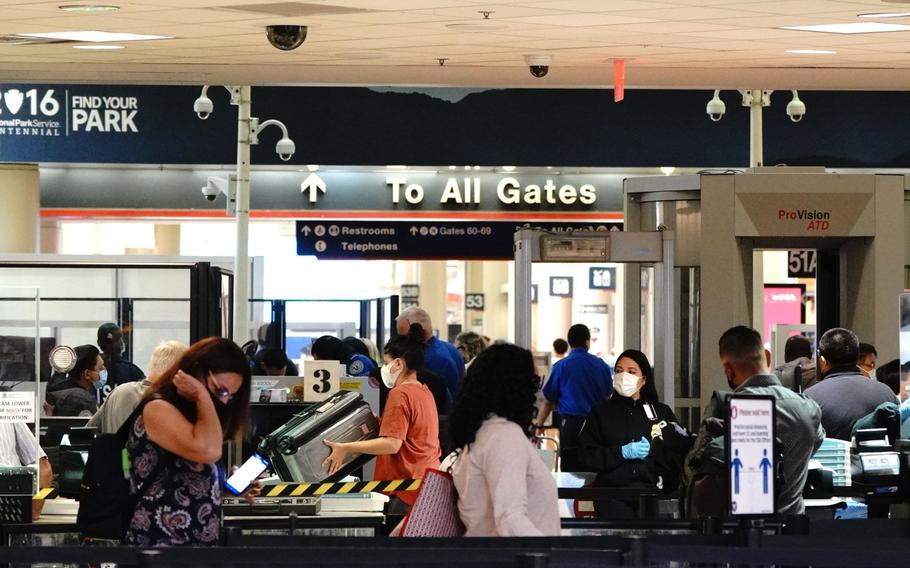Coronavirus
Europeans increasingly frustrated as White House maintains COVID travel restrictions
The Washington Post July 27, 2021

Travelers wearing protective masks are screened at a Transportation Security Administration security checkpoint at Los Angeles International Airport in Los Angeles on May 28, 2021. (Bing Guan/Bloomberg)
PARIS — European lawmakers and business groups on Tuesday voiced mounting criticism of the Biden administration after the White House said its restrictions on international travel would remain in place for the time being.
Whereas vaccinated U.S. tourists have been allowed to return to much of Europe for weeks, most Europeans still can't travel to the United States under a ban imposed last March by former President Donald Trump.
The White House said Monday that the continuation of existing travel restrictions was due to concerns over the highly transmissible delta variant. A number of European nations, including Spain, Britain and France, have recently seen a rise in cases linked to that variant.
But the delta variant has long been in the United States, already accounting for the majority of new known cases, and many European nations are now outpacing the United States in vaccinations, despite Europe's initially slower rollout.
E.U. critics of the U.S. approach have also pointed to less restrictive rules that are in place for travel from many other nations to the United States, including from countries with weak health systems and high coronavirus case numbers.
As vaccinated American tourists are traveling back and forth for their summer holidays in Paris or Rome again, European allies or partners of the Biden administration are finding it increasingly difficult to defend the U.S. approach that has been blamed for dividing European families and posing serious challenges to businesses.
"I think reciprocity makes sense," said Radoslaw Sikorski, who chairs the European Parliament's delegation for U.S. relations. "We have opened up the Schengen zone to American travelers, and the U.S. has not done that to our citizens."
Some experts said the cautious U.S. approach may be based on legitimate public health concerns about particular European countries. But in countries like Germany, where the ratio of fully vaccinated people is now higher than in the United States, the White House announcement prompted disbelief among many.
There is "no logical scientific explanation" for the U.S. approach, RND, one of Europe's largest local news providers, concluded in an editorial on Tuesday, describing the practice as a political scandal and evoking a "wall in the middle of the Atlantic."
The White House announcement could dampen the political will in Europe to convert U.S. vaccination cards to E.U. digital vaccine certificates, especially if the bloc's countries view the decision as a breach of trust, said Jacob Kirkegaard, a senior fellow at the German Marshall Fund.
European legislators appealed to Biden administration officials in person last week, arguing that the similar rates of infection and vaccination on each side of the Atlantic should mean open travel for the inoculated — in both directions. Sikorski said he and his colleagues met with members of the National Security Council and the State Department and asked that the United States match Europe's stance on American travel.
It's about more than tourism, Sikorski added. "You should remember there are thousands of Europeans stranded in the United States who have not seen their families in over a year, and this is a real hardship for a lot of people," he said.
Roland Lescure, a lawmaker with French President Emmanuel Macron's party, said around 100,000 French citizens based in the U.S. have been separated from their families because of the restrictions.
"The problem is French residents in the U.S. who do not have a green card or a U.S. passport. If they go back to France, they don't know if it will be possible for them to come back to the U.S.," said Lescure.
Citizens of other E.U. nations have faced similar challenges, prompting German Chancellor Angela Merkel to raise the issue during a meeting with Biden in Washington two weeks ago.
Due to their reliance on foreign exports, German businesses have been hit particularly hard by the U.S. restrictions.
In a statement on Tuesday, the country's association of mechanical engineering businesses, VDMA, called the White House decision "absolutely incomprehensible."
The association said many of its members have struggled to receive exemptions from the restrictions for their employees, hampering transatlantic trade at a time when both the United States and the E.U. are eyeing quick economic growth to make up for losses caused by the pandemic.
"There is no justification for the exclusion of European business travelers," said VDMA representative Ulrich Ackermann.
Airline industry representatives have similarly pointed at the economic damage linked to the restrictions. A spokeswoman for Virgin Atlantic, a Britain-based airline, argued that vaccinations should allow for safe transatlantic with the United States, which has been disrupted by similar restrictions.
"With world-leading vaccination programs in both the U.K. and U.S., there is a clear opportunity to safely open up travel between these two low-risk countries whilst protecting public health," she said. "Whilst the transatlantic corridor is closed, £23 million [$32 million] in economic value each day is restricted."
Ariès and Thebault reported from Brussels. The Washington Post's Karla Adam in London and William Glucroft in Berlin contributed to this report.